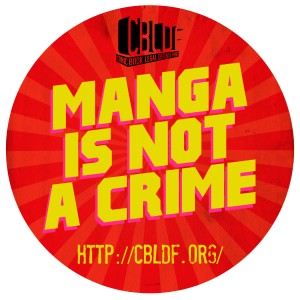 As Japan prepares to implement a new law which bans the possession of child pornography but exempts manga and anime, CNN released an over-the-top sensationalist video report this week that demonstrates a profound lack of knowledge about the formats.
As Japan prepares to implement a new law which bans the possession of child pornography but exempts manga and anime, CNN released an over-the-top sensationalist video report this week that demonstrates a profound lack of knowledge about the formats.
Much of the report by Tokyo correspondent Will Ripley is devoted to undercover footage of an Akihabara manga shop, which Ripley calls “a place that caters to young people.” (In fact manga is read by people of all ages.) Over mostly-blurred footage, Ripley describes “magazines and videos so graphic, so sexually explicit, we turned our undercover cameras off.” As Twitter user @zoid9000 pointed out, at least one of those blurred-out covers that was too much for CNN’s delicate cameras actually wasn’t pornographic at all.
Ignoring the fact that manga and anime cover every genre and interest under the sun, Ripley focuses only on a relatively minor subset and suggests that it will remain legal not because it’s free expression but because “anime animation and manga comics are a multi-billion dollar industry with political and lobbying power.”
Ripley soon proceeds to leading questions, asking politician Masatada Tsuchiya: “Are you concerned that this animated child porn could lead to criminal behavior?” (Shades of Fredric Wertham!) Tsuchiya responds in the affirmative, pointing to the recent arrest of a man accused of murdering a seven-year-old girl. Ripley’s voiceover notes here that “police seized large amounts of child porn from [the alleged murderer’s] home, but won’t say if it was real or animated.”
Later in the report Ripley talks to Shihoko Fujiwara, a representative of the anti-child-trafficking group Lighthouse. She brings up another crime that can supposedly be blamed on manga: “a case where a predator used a cartoon to convince a child sex abuse is normal.” In the examples cited by both Tsuchiya and Fujiwara, of course, horrific crimes were committed and should absolutely be prosecuted — but no one could seriously suggest that either of the them would have been prevented if only the perpetrators hadn’t owned manga.
Ripley does briefly talk to Japan Cartoonists Association lobbyist Ken Akamatsu, himself the creator of the popular manga series Love Hina and Negima! Magister Negi Magi, who points out in vain that “manga doesn’t involve actual children so there are no actual victims” and that “there’s no scientific evidence” that manga and anime actually cause people to commit crimes. Ripley nevertheless ends the report with the ominous pronouncement that “some fear [these] cartoons may be fueling the darkest desires of criminals.”
If you’d like to witness the biased and uninformed report for yourself, here it is:
We need your help to keep fighting for the right to read! Help support CBLDF’s important First Amendment work by visiting the Rewards Zone, making a donation, or becoming a member of CBLDF!
Contributing Editor Maren Williams is a reference librarian who enjoys free speech and rescue dogs.